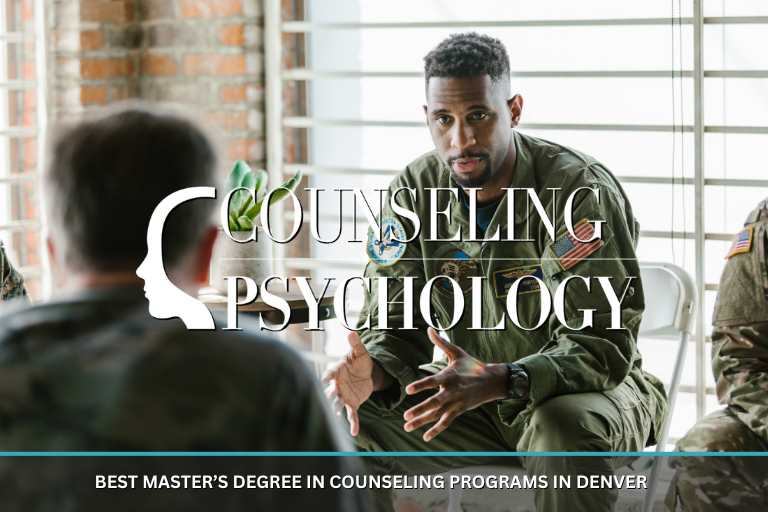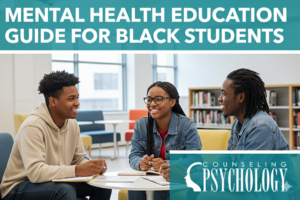Best Master’s Degree in Counseling Programs in Denver

Denver is a thriving hub for mental health professionals, making it an ideal location to pursue a master's degree in counseling. With Colorado’s growing emphasis on behavioral health services and recent expansions in state mental health funding, demand for well-trained counselors is high. According to the Colorado Department of Labor and Employment, the state anticipates a 23% increase in need for mental health counselors between 2020 and 2030—a rate that far outpaces the national average.
This favorable outlook, combined with Denver’s diverse communities and strong university presence, positions the city as a prime destination for graduate study in counseling. Programs in the region offer a variety of specializations, clinical training opportunities, and flexible learning formats to meet the needs of aspiring professionals. In addition, Denver's growing population and increasing awareness of mental health issues have created a surge in demand for services across all age groups. From elementary school children to aging adults, mental health counselors are becoming a vital part of community care systems.
This guide compares the top master's in counseling programs in Denver, with attention to accreditation, practicum placements, curriculum options, and factors that influence graduate outcomes. It also offers insight into licensure processes and real-world applications for aspiring counselors who seek to serve in Colorado.
2025 Top Accredited Master's in Counseling Programs in Denver
University of Northern Colorado
Greeley, CO - Public 4-Year - unco.edu
Master's - Marriage, Couples, and Family Counseling/Therapy M.A.
Campus Based - Visit Website
The University of Northern Colorado's Marriage, Couples, and Family Counseling M.A. program provides an immersive academic journey into complex relationship systems and interpersonal dynamics. With CACREP accreditation, students receive comprehensive training in systemic therapeutic approaches, emphasizing advanced clinical skills and ethical practice. The curriculum uniquely prepares professionals to navigate intricate family interactions, trauma interventions, and diverse population counseling. Rigorous coursework combines theoretical knowledge with practical experiences, ensuring graduates are thoroughly equipped for Licensed Marriage and Family Therapist (LMFT) certification and professional clinical practice.
- CACREP Accredited Program
- 66-75 Total Credit Hours
- Licensure Track for LMFT
- Specialized Relationship Systems Focus
- Minimum 3.0 GPA Requirement
- Comprehensive Clinical Training
- Diverse Coursework Options
- Pre-Admission Workshop Required
- Interpersonal Skills Assessment
- Trauma and Intervention Courses
Master's - School Counseling
Campus Based - Visit Website
UNC's School Counseling Master's program offers a transformative educational pathway for aspiring educational support professionals. Featuring CACREP accreditation and 600 hours of intensive internship experience, students develop comprehensive skills to support students' academic and personal development. With flexible campus options in Greeley and Denver, the program accommodates diverse student needs. Graduates become Nationally Certified Counselors prepared to excel in various educational environments, demonstrating expertise in addressing student challenges, implementing intervention strategies, and fostering inclusive learning environments.
- CACREP-accredited program
- 600-hour internship
- Nationally Certified Counselor eligible
- Small class sizes
- Experienced faculty
- Greeley and Denver options
- Hands-on training
- Diverse school settings
- Licensure preparation
- 63-75 credits required
Master's - Clinical Mental Health Counseling
Online & Campus Based - Visit Website
The Clinical Mental Health Counseling Master's program at University of Northern Colorado represents a cutting-edge approach to professional counseling education. Offering flexible hybrid learning formats, the program provides comprehensive training in diagnostic techniques, treatment planning, and ethical practice. Students benefit from hands-on clinical supervision, preparing them for diverse mental health careers. With a focus on working with varied populations and opportunities for national certification, graduates are strategically positioned to make meaningful contributions in psychological services, community health centers, and potential private practice settings.
- 60 total credit hours
- CACREP accredited program
- Multiple campus delivery options
- Flexible weekend and semester formats
- Clinical training with live supervision
- Prepare for national counselor certification
- Work with diverse populations
- State-of-the-art Psychological Services Clinic
Regis University
Denver, CO - Private 4-year - regis.edu
Master's - M.A. in Marriage and Family Therapy
Online & Campus Based - Visit Website
Regis University's Marriage and Family Therapy Master's program offers an innovative 60-credit pathway into mental health counseling. Designed for aspiring therapists, the COAMFTE-accredited curriculum focuses on systemic and relational therapeutic approaches. Students experience intimate learning environments with small class sizes and comprehensive clinical training. The hybrid program provides flexible scheduling, enabling completion within 2.5-3 years. With a remarkable 95% job placement rate, graduates are prepared to address complex family dynamics through evidence-based interventions. Coursework emphasizes practical skills development, ensuring students can effectively support individuals, couples, and families through nuanced emotional challenges.
- 60-credit Master's degree program
- 95% job placement rate
- COAMFTE accredited program
- $806 per credit hour
- 2.5-3 years to complete
- Small class sizes
- On-campus and weekend formats
- Practicum and internship included
- Thornton Campus location
- Systemic therapy approach
Master's - Master of Arts in Counseling: Clinical Mental Health Counseling
Campus Based - Visit Website
Regis University's Clinical Mental Health Counseling Master's program delivers a comprehensive educational experience for future mental health professionals. The 60-credit curriculum meets Colorado Licensed Professional Counselor requirements and provides robust training in diagnostic techniques and therapeutic interventions. Students benefit from a remarkable 100% national counseling exam pass rate and 95% job placement within one year of graduation. Evening and weekend formats accommodate diverse student needs, with tuition at $896 per credit hour. The CACREP-accredited program emphasizes social justice principles and equips graduates to excel in community agencies, nonprofits, private practices, and specialized treatment settings.
- 60-credit counseling program
- 100% national exam pass rate
- 95% job placement rate
- Meets LPC academic requirements
- 2.5-3 year completion time
- $896 per credit hour
- Evening and weekend classes
- Onsite counseling training clinic
- CACREP accredited program
- Social justice emphasis
University of Denver
Denver, CO - Private 4-year - du.edu
Master's - Master of Arts in School Counseling
Online Learning - Visit Website
The University of Denver's online Master of Arts in School Counseling provides a comprehensive, socially conscious pathway for professionals seeking to support P-12 students. Distinguished by its CACREP accreditation and unique no-GRE admission policy, the program enables students to complete their degree in just 22 months. With an emphasis on addressing academic, career, and emotional needs, students gain extensive practical experience through a 100-hour practicum and 600-hour internship. The curriculum integrates social justice principles, preparing graduates to become transformative counselors equipped to navigate complex educational environments and support diverse student populations.
- CACREP Accredited
- 22-Month Track Available
- No GRE Required
- Online Program
- 100-hour Practicum
- 600-hour Internship
- Licensure Eligibility
- Rolling Admissions
- Start Dates in Jan, Jun, Sep
- Social Justice Focus
Master's - Master of Arts in Counseling Psychology (Clinical Mental Health Counseling)
Campus Based - Visit Website
University of Denver's Master of Arts in Counseling Psychology, specializing in Clinical Mental Health Counseling, offers a robust 24-month program designed to cultivate compassionate and skilled mental health professionals. The curriculum emphasizes evidence-based practices, holistic approaches, and social justice principles, preparing students for professional counselor licensure. With 100% tuition assistance and opportunities for practicum experiences in community settings, students develop comprehensive therapeutic skills. The MPCAC-accredited program provides diverse career pathways, enabling graduates to excel in various mental health environments and potentially pursue advanced doctoral studies.
- 90 Credit Hours Clinical Concentration
- 24-Month Program Length
- Licensure Preparation Track
- Practicum in Community Settings
- 100% Tuition Assistance
- MPCAC Accredited Program
- Diverse Career Opportunities
- Research and Clinical Tracks
University of Colorado Denver/Anschutz Medical Campus
Denver, CO - Public 4-Year - ucdenver.edu
Master's - Master of Arts in Couple and Family Therapy
Campus Based - Visit Website
The University of Colorado Denver's Master of Arts in Couple and Family Therapy offers a comprehensive 54-credit program that transforms mental health professionals through a social justice-oriented curriculum. COAMFTE-accredited, the program emphasizes systemic therapeutic approaches and cultural sensitivity. Students engage in mentored clinical experiences across diverse settings, developing advanced skills in relational counseling. Admission requires a competitive application process, including interviews and recommendation letters. The program typically spans 2.5-3.5 years, preparing graduates to provide nuanced, inclusive mental health services with a strong commitment to equity and professional excellence.
- COAMFTE Accredited Program
- 54-credit Master's Degree
- On-campus program
- 2.5-3.5 years completion time
- Fall/Spring admission cycles
- Application deadline: Feb 1 (Fall)
- Application deadline: Sept 1 (Spring)
- Required interview process
- Three recommendation letters needed
- Social justice focused curriculum
Master's - Master of Arts in Counseling, School Counseling
Campus Based - Visit Website
CU Denver's Master of Arts in School Counseling provides a robust 63-credit CACREP-accredited program designed to cultivate skilled educational advocates. Students receive comprehensive training through the Student and Community Counseling Center, focusing on adolescent and child support with an emphasis on diversity and inclusion. Tailored for working professionals, courses are strategically scheduled in late afternoons and evenings. The curriculum develops culturally informed intervention strategies, preparing graduates to address complex educational and developmental challenges. Competitive admissions require a holistic application including recommendations, transcripts, resume, and a compelling written statement.
- CACREP-accredited program
- 63 credit hours
- 3 to 4 years completion
- On campus courses
- Late afternoon classes
- Evening classes available
- Real-world counseling experience
- Focus on diversity
- Equity-focused services
- Competitive admissions
Master's - Master of Arts in Counseling (Clinical Mental Health)
Campus Based - Visit Website
The Clinical Mental Health Counseling concentration at CU Denver's Master of Arts program offers a transformative 63-credit pathway for aspiring mental health professionals. CACREP-accredited, the program prepares students to become Licensed Professional Counselors through rigorous training and live supervision. Emphasizing culturally responsive care, students gain hands-on experience across diverse clinical settings. The curriculum integrates practical skills with theoretical foundations, enabling graduates to address complex mental health needs effectively. With competitive admissions and a comprehensive approach, the program equips counselors to make meaningful interventions in community mental health landscapes.
- CACREP-accredited program
- 63 total credit hours
- On-campus counseling clinic
- Licensed Professional Counselor preparation
- Culturally responsive framework
- Diverse client settings training
- 3-4 year completion time
- Supervised counseling experience
- Competitive admissions process
- Group interview required
Metropolitan State University of Denver
Denver, CO - Public 4-Year - msudenver.edu
Master's - Master of Science in Clinical Behavioral Health (Addictions Counseling)
Campus Based - Visit Website
The Metropolitan State University of Denver's Master of Science in Clinical Behavioral Health with Addictions Counseling concentration offers a robust pathway for aspiring counseling professionals. This comprehensive program uniquely prepares students for dual licensure as Licensed Addiction Counselors (LAC) and Licensed Professional Counselors (LPC), strategically designed to address complex substance abuse treatment needs. Students benefit from a skills-based curriculum that balances theoretical knowledge with practical field experience, featuring evening and weekend classes in a flexible hybrid format. With no GRE requirement and a total of 61 credits, the program takes 2.5-3 years to complete, costing approximately $585 per credit. Graduates are equipped to make significant impacts across diverse treatment settings, emphasizing hands-on professional development in addiction counseling.
- Dual LAC and LPC licensure
- 61 total credit program
- Evening and weekend classes
- No GRE required
- Skills-based curriculum
- Hybrid learning format
- $585 per credit
- Full-time track 2.5-3 years
- Part-time option available
- Practicum and internship included
Why Earn a Master's in Counseling in Denver?
Denver’s healthcare infrastructure, counseling clinics, nonprofit mental health organizations, and public school systems provide a range of training and employment options. As counseling programs in the region are closely aligned with community needs, students gain direct exposure to real-world challenges and diverse populations. Many programs also collaborate with Denver-based mental health providers to offer clinical placements, mentorships, and specialized training opportunities.
Colorado’s policy environment further supports behavioral health growth. Recent legislative initiatives have increased funding for school-based mental health services, substance abuse prevention programs, and integrated behavioral care models. Denver-based students benefit from access to culturally varied urban and suburban populations, proximity to major medical centers and school districts, and numerous professional networking opportunities through local and statewide organizations such as the Colorado Counseling Association.
In addition to academic advantages, studying in Denver provides a high quality of life. The city offers a vibrant urban environment with access to outdoor recreation, cultural events, and a progressive community that values wellness and education.
Key Considerations When Choosing a Denver Counseling Program
Before selecting a program, it is important to evaluate several critical factors beyond location and cost. Accreditation, clinical training opportunities, and licensure alignment are essential to long-term success. Additional elements such as faculty expertise, alumni outcomes, and student support services can also influence the overall quality and impact of a counseling degree.
Accreditation
The Council for Accreditation of Counseling and Related Educational Programs (CACREP) sets national standards for counseling education. All listed Denver programs meet CACREP criteria, ensuring that graduates are eligible for licensure in Colorado. Accreditation also facilitates reciprocity across state lines for graduates who may eventually relocate.
Licensure Preparation
Colorado LPC candidates must complete a 60-credit graduate program, pass the National Counselor Examination (NCE), and complete 2,000 hours of post-degree supervision. School counselor candidates must meet specific course and internship requirements governed by the Colorado Department of Education. Programs that provide exam preparation resources and licensure support services can help graduates transition more smoothly into professional practice.
Practicum and Internship Experiences
Hands-on clinical experience is vital for skill development. Most programs offer 600–700 hours of supervised training. Students should consider the quality of supervision, variety of placement sites, and faculty support. Some programs offer in-house training clinics, while others provide access to external community-based mental health agencies, schools, and hospitals throughout the Denver area.
Flexible Learning Formats
Evening, weekend, and hybrid course options make Denver programs accessible to working professionals. Applicants should assess whether a program's delivery format matches their schedule and learning preferences. Flexibility can also help students better manage the demands of coursework, employment, and family responsibilities.
Career Outlook for Counseling Graduates in Denver
Counseling graduates in Denver enter a strong job market supported by public and private investment in mental health services. Career paths are available in diverse settings with opportunities for advancement and specialization. The expansion of telehealth, school-based counseling, and integrated behavioral care means that qualified professionals are needed in traditional and emerging roles.
Employment Settings
Graduates often find employment in:
- Community mental health centers
- Public school districts
- Private group or solo practices
- Substance abuse treatment programs
- Hospital-based behavioral health departments
- Correctional facilities and juvenile justice programs
- Veterans' services and trauma recovery centers
Each of these environments offers unique challenges and rewards. Some graduates choose to specialize in working with youth, while others pursue careers in grief counseling, trauma-informed care, or couples therapy. Denver’s diversity of clients and clinical settings makes it possible to explore a wide range of professional paths.
Salary and Job Growth Trends
According to the U.S. Bureau of Labor Statistics:
- Mental Health Counselors in the Denver metro area earn a median salary of $56,700
- School Counselors earn a median of $63,200
Salaries vary based on setting, credentials, and experience. Those in private practice or specialized areas such as trauma, bilingual counseling, or neurodiverse populations often command higher wages. With increasing demand and a statewide workforce shortage in mental health services, graduates may also benefit from employer-sponsored tuition reimbursement, sign-on bonuses, or loan repayment programs through nonprofit organizations.
Steps to Licensure in Colorado
| Step | Requirement |
| 1 | Earn a CACREP-accredited 60-credit master's degree |
| 2 | Complete 2,000 hours of supervised post-degree experience |
| 3 | Pass the National Counselor Examination (NCE) |
| 4 | Apply for licensure through the Colorado DORA |
In addition to meeting these requirements, some professionals pursue further certifications such as Licensed Addiction Counselor (LAC) or certification in play therapy, trauma counseling, or EMDR. Continuing education and professional development are essential to long-term growth and ethical practice.
Admissions Process and Tips
Admission to Denver's top counseling programs is competitive, and each institution has specific requirements. Strong applicants demonstrate academic readiness, interpersonal skills, and a clear motivation for entering the field. Admissions committees are looking for candidates who will not only succeed academically but also contribute to the learning community and uphold ethical standards in professional practice.
Typical Application Requirements
- Bachelor's degree from a regionally accredited institution
- GPA of 3.0 or higher (program-dependent)
- Letters of recommendation
- Statement of purpose detailing counseling goals
- In-person or virtual interview with faculty
- Resume or CV outlining relevant experience
Application deadlines often fall between January and March for fall enrollment. Prospective students should verify exact dates and begin the process early to secure placement in desired cohorts. Attending program information sessions or speaking with current students can provide helpful insights when preparing application materials.
Charting a Successful Counseling Career in Denver
Denver’s top counseling programs prepare students for meaningful careers in a region deeply committed to mental health services. From trauma-informed care to school counseling and private practice, these programs equip graduates with the knowledge and experience to serve a wide range of communities. Employers in the region consistently seek counselors who are culturally competent, adaptable, and committed to ethical service.
With strong local demand, accessible training opportunities, and a diverse population, Denver offers a supportive environment for building a counseling career. Students who carefully select an accredited program and engage fully in clinical experiences are well-positioned to thrive in this evolving field. Long-term success often includes participation in professional associations, ongoing training, and supervision beyond licensure. Building a strong foundation through graduate education can open doors to leadership, teaching, or advocacy roles in the broader mental health landscape.
Sources
- U.S. Bureau of Labor Statistics – Mental Health Counselors
- Council for Accreditation of Counseling and Related Educational Programs (CACREP)
- Colorado Department of Labor and Employment
- Colorado Department of Regulatory Agencies – LPC Requirements
- Colorado Counseling Association



